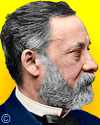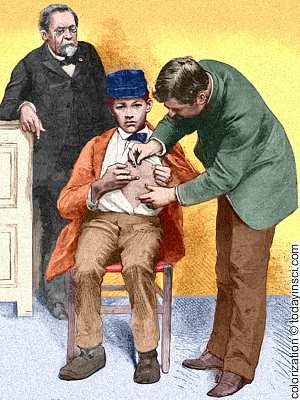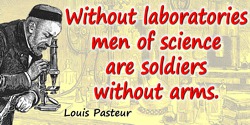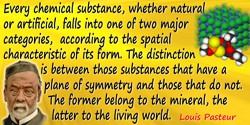 (source)
(source)
|
Louis Pasteur
(27 Dec 1822 - 28 Sep 1895)
French chemist who became a founder of microbiology. He created and tested vaccines for diphtheria, cholera, yellow fever, plague, rabies, anthrax, and tuberculosis.
|
Pasteur and the Modern Era of Immunization
On July 6, 1885, Louis Pasteur and his colleagues injected the first of 14 daily doses of rabbit spinal cord suspensions containing progressively inactivated rabies virus into 9-year-old Joseph Meister, who had been severely bitten by a rabid dog two days before. This was the beginning of the modern era of immunization, which had been presaged by Edward Jenner nearly 100 years earlier.
Pasteur's decision to treat the child followed 4 years of intensive research, culminating in the development of a vaccine capable of protecting experimentally challenged rabbits and dogs. His decision was difficult:1
The immunization was successful; and the Pasteur rabies immunization procedure was rapidly adopted throughout the world. By 1890, there were rabies treatment centers in Budapest, Madras, Algiers, Bandung, Florence, Sao Paulo, Warsaw, Shanghai, Tunis, Chicago, New York, and many other places throughout the world.
The basic “Pasteur Treatment,” based on brain tissue vaccine with the addition of formaldehyde, is still used in many countries of the world where rabies is prevalent. This treatment still involves immunizations given daily for 14-21 days, and it still carries the same risk of neurologic sequelae as in Pasteur’s day. In the United States and other developed countries, more potent, safer, but very expensive, cell culture-based rabies vaccines are combined with hyperimmune globulin for postexposure treatment. The efficacy of such regimens has been well proven.
Another era in vaccine development is now beginning—an era based on the practical application of recombinant-deoxyribonucleic acid (DNA) technology and other novel genetic manipulations of rabies and other viruses and microorganisms. These new technologies promise even more potent and safer vaccines, as well as lower costs, improved stability, and easier delivery throughout the world to people at risk.
In celebrating the Pasteur centennial, the preeminent role of vaccines in the control of infectious diseases is recognized; as René Dubos stated:2
1 Cuny H. Louis, Pasteur: the Man and His Theories (1963), 173.
2 R.J. Dubos, Louis Pasteur: Free Lance of Science (1950), 352-353.
- Science Quotes by Louis Pasteur.
- 27 Dec - short biography, births, deaths and events on date of Pasteur's birth.
- Louis Pasteur’s Discovery of Rabies Immunization - from Harper’s Weekly (1885)
- The Private Science of Louis Pasteur, by Gerald L. Geison. - book suggestion.
- Booklist for Louis Pasteur.








